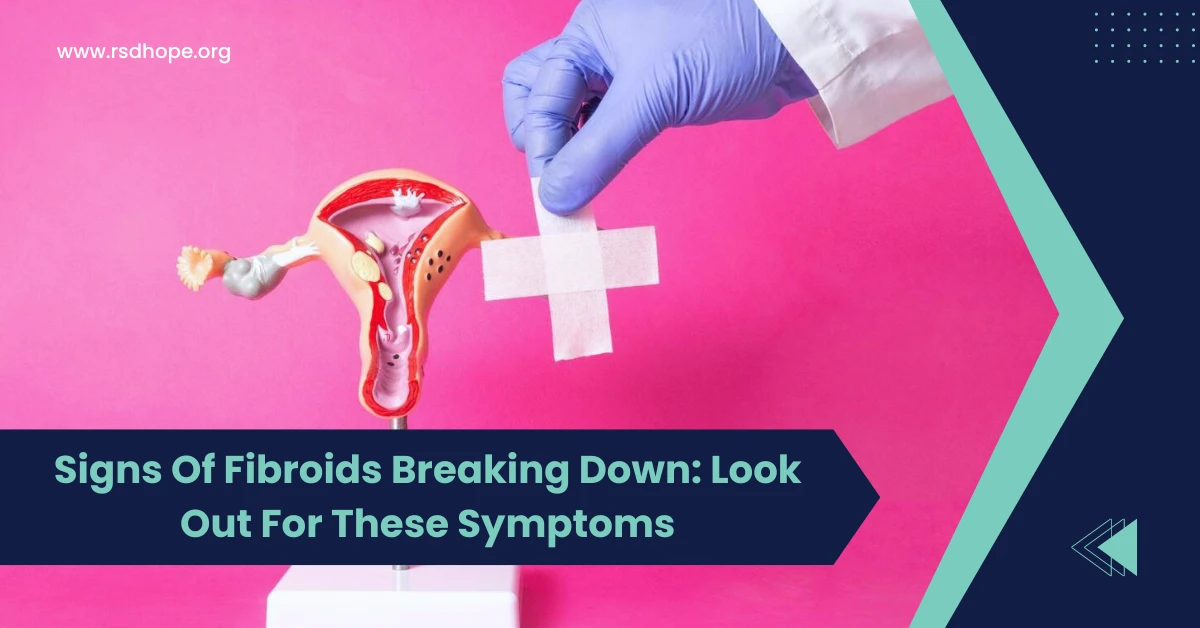Fibroids are non-cancerous growths that develop in the uterus, typically composed of muscle and fibrous tissue. Their formation is a complex process influenced by various factors, including hormonal imbalances and genetic predisposition.
However, sometimes these fibroids can undergo a process called fibroid degeneration, where they start to break down or shrink. This blog post aims to explore the signs that indicate fibroids are breaking down, providing valuable information for women who may be experiencing this condition.
Key Takeaways
1) Fibroids are non-cancerous growths in the uterus that can undergo a process called fibroid degeneration.
2) Fibroid degeneration refers to the breakdown or shrinkage of fibroids.
3) This blog post discusses the signs of fibroids breaking down to raise awareness and promote timely medical attention.
How are Fibroids Formed?
Fibroids are non-cancerous growths that develop within the uterine wall or on the outer surface of the uterus. Their formation is influenced by various factors, including hormonal imbalances, particularly related to estrogen and progesterone. Some women may have a genetic predisposition that increases their likelihood of developing fibroids.
Additionally, fibroids tend to grow and change in size during different stages of a woman’s life, often influenced by hormonal fluctuations. While fibroids are typically non-cancerous, they can cause a range of uncomfortable symptoms and potentially impact a woman’s overall health and well-being.
Also Read: Best Vitamins For Women Over 40
What is Fibroid Degeneration?
Fibroid degeneration refers to the process in which fibroids start to break down or shrink. This can occur due to changes in hormone levels, such as during pregnancy or the transition to menopause. Fibroid degeneration can be a natural process, but it is essential to recognize its signs and implications. Identifying fibroid degeneration is crucial as it may influence the appropriate treatment options and management strategies.
Signs of Fibroids Breaking Down
When fibroids begin to degenerate, women may experience various signs and symptoms. These can include:
1. Pelvic pain: As fibroids break down, they can cause discomfort or sharp, intense pain in the pelvic region.
2. Heavy menstrual bleeding: Fibroid degeneration may lead to heavier, prolonged, or irregular menstrual bleeding.
3. Pressure on the bladder or rectum: Degenerating fibroids can put pressure on surrounding organs, causing urinary or bowel discomfort.
4. Changes in menstrual patterns: Women may notice changes in their menstrual cycle, such as irregularity or spotting between periods.
5. Anemia: Excessive bleeding caused by fibroid degeneration can lead to anemia or low iron levels.
6. Fertility issues: In some cases, degenerating fibroids can impact fertility or increase the risk of complications during pregnancy.
It’s important to note that not all women experiencing fibroid degeneration will exhibit these signs, and the severity can vary.
Types of Fibroid Degeneration
There are different types of fibroid degeneration, each with its own characteristics and causes:
1. Hyaline degeneration: This type of degeneration occurs when the fibroid’s cells begin to die, leading to the formation of a hyaline (glassy) material within the fibroid.
2. Cystic degeneration: In this case, the fibroid develops fluid-filled cysts or areas of necrosis (cell death) within its structure.
3. Red degeneration: Also known as hemorrhagic degeneration, this type involves bleeding within the fibroid, which can cause severe pain and swelling.
The specific type of degeneration can influence the symptoms experienced by women with fibroids.
Diagnosis and Treatment of Fibroid Degeneration
If you experience any of the signs mentioned above, it’s crucial to seek medical advice from a healthcare professional. Diagnosing fibroid degeneration typically involves a combination of physical examinations, ultrasound imaging, and possibly magnetic resonance imaging (MRI) scans.
The treatment options for fibroid degeneration vary depending on the severity of symptoms, the type of degeneration, and individual factors. In some cases, medications or non-invasive procedures like uterine artery embolization may be recommended. However, in more severe cases, surgical intervention, such as a myomectomy (removal of fibroids) or hysterectomy (removal of the uterus), may be necessary.
It’s essential to discuss all available options with your healthcare provider and make an informed decision based on your specific circumstances and personal preferences.
Read More: Does Drinking Water Help Your Period End Faster?
Conclusion
Understanding the signs of fibroids breaking down is crucial for women’s health and well-being. Fibroid degeneration can cause a range of symptoms, from pelvic pain and heavy bleeding to pressure on surrounding organs and fertility issues. Recognizing these signs and seeking appropriate medical attention is essential for timely diagnosis and effective treatment.
By staying informed about fibroids and their potential complications, women can make informed decisions about their health and take proactive steps to manage this condition. Remember, early detection and proper management can help alleviate the discomfort and potential risks associated with fibroid degeneration.
FAQs
A: No, fibroids are non-cancerous growths in the uterus. However, they can still cause significant discomfort and potentially impact a woman’s health.
A: In some cases, fibroids may shrink or degenerate naturally, particularly after menopause when hormonal levels change. However, medical intervention may still be necessary if symptoms persist or worsen.
A: In certain cases, degenerating fibroids can impact fertility or increase the risk of complications during pregnancy. It’s essential to seek medical advice if you are trying to conceive and have fibroids.
A: The prevalence of fibroid degeneration is not well-documented, as it can occur at various stages of a woman’s life and with varying severity. However, it is considered a relatively common phenomenon among women with fibroids.
Article Sources:
– Office on Women’s Health, U.S. Department of Health and Human Services: https://www.womenshealth.gov/a-z-topics/uterine-fibroids
– National Institute of Child Health and Human Development: https://www.nichd.nih.gov/health/topics/uterine/conditioninfo/treatments

